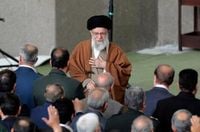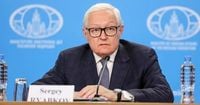On April 1, 2025, tensions between the United States and Iran escalated following a series of provocative statements from President Donald Trump regarding Iran’s nuclear program. In response, Russian Deputy Foreign Minister Sergei Ryabkov condemned Trump's threats, asserting that any attack on Iran’s nuclear infrastructure would lead to disaster.
Ryabkov's remarks came during an interview with the magazine "International Affairs," where he expressed concern over the U.S. approach to Iran. "We have heard threats, ultimatums," he stated, adding, "We consider such methods inappropriate, we condemn them, and we see it as the U.S. imposing its will on Iran." This statement reflects Russia’s growing apprehension about the potential consequences of U.S. military action in the region.
Trump’s warnings included a stark promise of bombing Iran if a nuclear agreement was not reached, stating, "If they do not reach an agreement, there will be bombing. This will be a bombing on a scale never seen before." His comments were made after he withdrew the U.S. from the 2015 nuclear agreement, known as the Joint Comprehensive Plan of Action (JCPOA), which had imposed strict limits on Iran’s nuclear activities in exchange for sanctions relief.
Ryabkov emphasized that Trump’s recent comments only complicate the situation regarding Iran. "The consequences of this, especially if attacks are aimed at nuclear infrastructure, could lead to disaster for the entire region," he warned. He urged for a doubling of efforts to reach a reasonable agreement, indicating Russia's willingness to assist in negotiations.
Meanwhile, Iranian Foreign Minister Seyed Abbas Araghchi announced that Iran had sent an official response to Trump’s letter regarding negotiations through Oman. "We are not avoiding negotiations; the issue lies in the U.S. violating commitments, so trust needs to be rebuilt," stated Iranian President Masoud Pezeshkian. Iran remains firm in its stance against direct negotiations with the U.S., particularly under the current administration's policy of maximum pressure.
In a parallel development, Ali Larijani, a prominent Iranian politician, reiterated Iran's commitment to a religious edict that prohibits the possession of nuclear weapons, issued by Supreme Leader Ayatollah Ali Khamenei. However, he warned that if the U.S. makes a mistake, Iran would be compelled to pursue nuclear weapons under pressure from its own populace. "Any military action against Iran would have unpredictable consequences, and Iran's nuclear program cannot be destroyed solely by airstrikes," Larijani asserted.
On March 31, Khamenei declared that any military action taken by the U.S. would be met with a strong response from Iran. His comments came as Iran lodged a complaint with the United Nations Security Council regarding Trump's aggressive rhetoric, which they deemed reckless and a blatant violation of international law.
Iran's Ambassador to the UN, Amir Saeid Iravani, warned against any military adventures, stating that Tehran would respond swiftly and decisively to any acts of aggression against its sovereignty or national interests. This highlights Iran's determination to defend itself amid rising tensions.
Despite expressing openness to negotiations, Trump has revived a strategy of maximum pressure aimed at isolating Iran from the global economy and driving its oil exports to zero. Earlier in March, he sent a letter urging Iran to engage in new negotiations on its nuclear program, warning of possible military action if Tehran declined.
Araghchi confirmed that Iran had sent a formal response to Trump’s letter on March 26, emphasizing that while they are open to indirect negotiations, direct talks are off the table as long as the U.S. continues its aggressive posturing.
Larijani suggested that indirect negotiations could serve as an opportunity for both Iran and the U.S. to clarify their positions and assess each other’s views, potentially leading to appropriate solutions. This reflects a glimmer of hope for diplomatic engagement amid escalating tensions.
The backdrop to these developments is the history of the 2015 nuclear agreement, which was signed by Iran and the five permanent members of the UN Security Council plus Germany (collectively known as the P5+1). The agreement aimed to limit Iran’s nuclear capabilities while allowing for the gradual lifting of economic sanctions. However, Trump's withdrawal from the JCPOA in 2018 and the subsequent reimposition of sanctions have led Iran to gradually reduce its commitments under the agreement.
As the situation unfolds, the international community watches closely, with many calling for de-escalation and renewed dialogue. The potential for conflict remains high, and the stakes are significant, not only for Iran and the U.S. but for regional stability as a whole.
In summary, the recent exchanges between the U.S. and Iran illustrate the precarious nature of international relations in the context of nuclear diplomacy. With both sides standing firm in their positions, the path to a peaceful resolution appears fraught with challenges.





